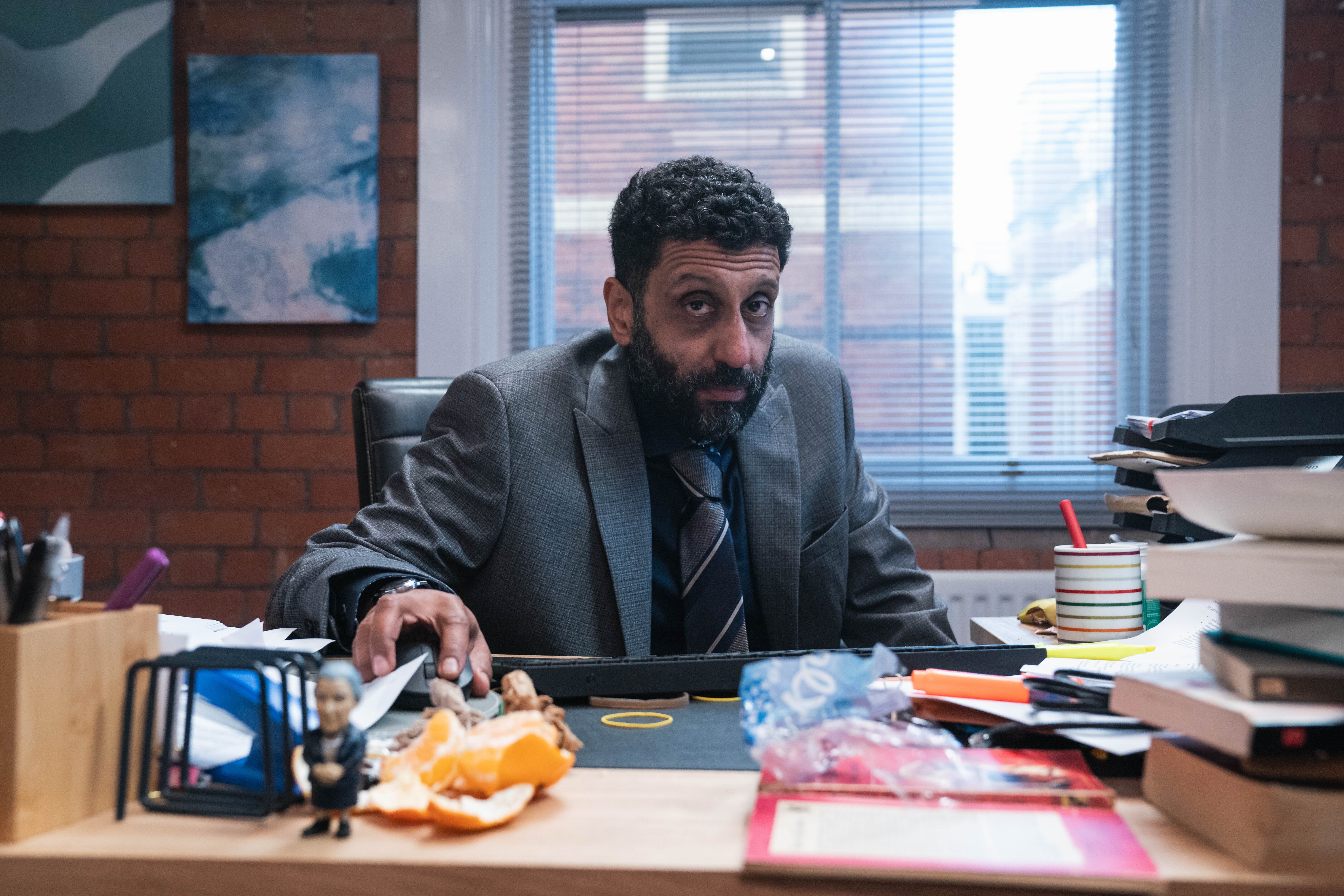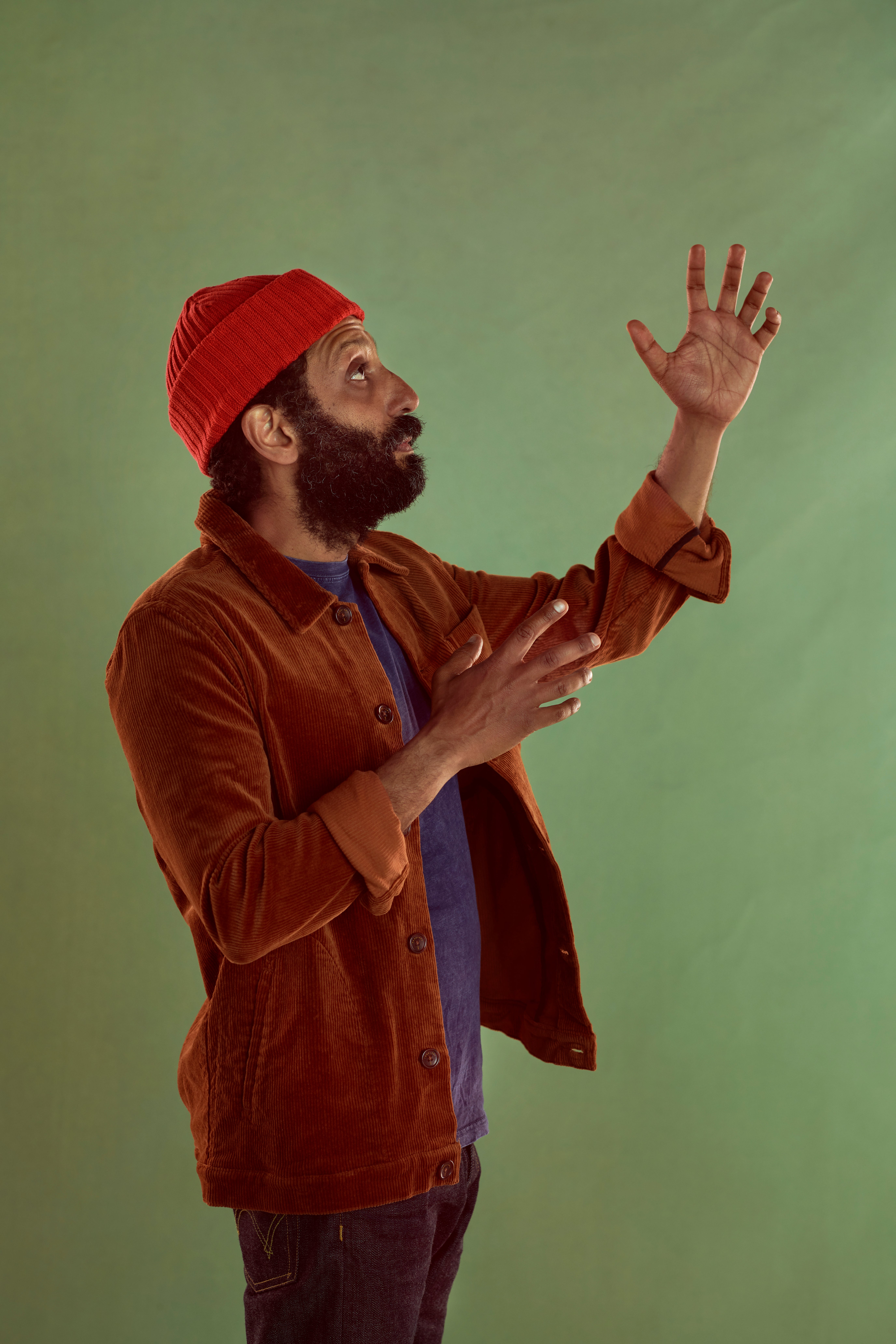When Adeel Akhtar began his career in the early 2000s, he didn’t see a lot of people like him on TV. “Tiny little Asian men with tired faces – there weren’t many of us out there,” says the actor, who at 5ft 6in matches the height of Tom Cruise. “But I’m doing a spot of work now, and people are hiring me, and asking my opinion.”
“Spot of work” is an understatement. Over the years, the 44-year-old has developed a reputation as one of those actors who is the standout in everything they do; “scene-stealer” is the professional term. His moniker in the biz is literally “Ideal Actor”, a play on his name that speaks to how highly regarded Akhtar is in the industry, renowned for bruising, humane and endlessly intriguing performances.
His breakthrough arrived in 2010 with Chris Morris’s fearless satire Four Lions, in which he played a bumbling Muslim extremist who manages to blow himself up in a field of sheep. In 2017, he became the first non-white actor to win a Lead Actor TV Bafta for his role as the raging patriarch in the honour killing drama Murdered By My Father. He bagged another in 2023 for his part as a messed-up widower in Sherwood. His scene of heinous violence was arguably the most shocking moment of British drama in the whole year.
Today, we meet in his publicist’s offices in Fitzrovia, on the first cold snap of the year. He’s cosy in a soft black hoodie and fuzzy beard, as he tells me how he used to wish he looked different. Mainly, a little less sleepy. “I remember thinking that maybe, if I looked a bit more awake, then I’d be the type of actor I thought I should be,” he says. “But over the years, I’ve reached this level of self-acceptance.” He’s described as “hangdog” in almost every interview, with one journalist even going so far as to compare him to a basset hound. “They did,” he says, chuckling on hearing it again. “They specified what breed of dog.”
Akhtar’s sleepy look came in handy for his latest role: a world-weary, insomniac defence lawyer in BBC One’s Showtrial. His character Sam is a barrister with Benzodiazepines piled high on his bedside table and a reputation for winning lost causes; his latest client is a police officer (Michael Socha) accused of murdering a famous climate activist. The case, Sam’s son fears, will “pickle his cortisol”.
It’s a series brimming with hot-button issues, from corrupt cops to culture wars and climate protests, but Showtrial refuses to pick a side. Akhtar is similarly even-handed. “When you’re within the realms of politics or legislation, the idea of somebody’s guilt or innocence all seems quite clear cut, doesn’t it?” he says. “But if you shift to another perspective, it becomes less clear.”
Playing Sam, Akhtar was afforded a peep into the other life he could have had. The son of a Pakistani father and Kenyan mother, he followed his dad’s wishes and studied law, before dropping out of university to become an actor. His parents were first-generation immigrants who fell in love working at Heathrow airport. They lived in Hounslow, west London, as part of a large Asian community. “But then there was this flight, among our lot, to get out into the suburbs,” says Akhtar. His parents, chasing “the idea of Englishness, of the green belt”, moved the family to a Buckinghamshire village.
Village life wasn’t always idyllic. Akhtar was one of a handful of brown kids at his school in Cheltenham and had stones thrown at him when he was very little. On one occasion, his mum had been there; she stood in front of him, shielding Akhtar with her body. In later years, when he was living in a van and struggling to find work, he had his beard yanked in the street by a stranger. Another time, a group of men shouted slurs at him as he went up an escalator.

The incident that cut the deepest, though, was in 2002, when he was arrested at JFK airport in New York. He had been on his way to enrol at drama school and was mistaken for a terrorist – he was handcuffed and detained for six hours. Afterwards, his dad took him to a lawyer to try to build a case against the FBI. It couldn’t be done, and Akhtar has called it his greatest disappointment.

Watch Apple TV+ free for 7 days
New subscribers only. £8.99/mo. after free trial. Plan auto-renews until cancelled

Watch Apple TV+ free for 7 days
New subscribers only. £8.99/mo. after free trial. Plan auto-renews until cancelled
All the work Akhtar has done since that frightening day at JFK has been about restoring his dignity – about rejecting the narrow, racist stereotype foisted upon him in that moment. “[Being put in that box] can hurt and it can frustrate, and it can make you feel less than the person who you want to be,” he says now, clutching his chest, “I don’t really need to know that I could be put in a context where everything that I’m about stops existing because somebody sees me in a different way, because somebody sees me as a threat or an enemy.”
Perhaps the furthest he’s strayed from that stereotype is in Netflix’s forthcoming spy thriller Black Doves, in which he plays the prime minister. “My head was in a spin when I was asked to do that,” he says. “I was like, hang about, this is the first time a British Asian person has been asked to play the PM.” He can’t imagine that script landing on his doorstep 20 years ago. “That would have been in the realm of fantasy. Like, how could that ever happen in the world? And, in reality, we did have an Asian prime minister.”

On paper, one of Akhtar’s best-known projects, the cult comedy Four Lions which followed a group of terrorists, might seem like an odd choice for an actor who was trying to distance himself from stereotypes. In practice, it was a brilliantly subversive take on a taboo topic. Starring Akhtar, Riz Ahmed, Kayvan Novak, and Nigel Lindsay, the film followed a gang of spectacularly moronic suicide-bombers who attempt to plan a terrorist attack in Britain; Akhtar’s character, Faisal, is on a mission to train crows to carry explosives. The way Four Lions dealt with extremism was truly groundbreaking both for viewers and for Akhtar himself. It made fun of it, he says, but it also humanised these men by painting them as a bunch of lost boys with “misplaced creative energy”.
“It’s like when you get a group of boys together and they decide they’re going to be in a band and take over the world,” Akhtar says. “But for these particular boys at that time, their creative energy is misplaced in the idea of destroying something and making themselves invisible in some way. There’s something really heartbreaking about that.”
We have this ability in this country to pull the rug at the right time, so we can make things more knowable to ourselves
All the same, Akhtar was apprehensive about joining the project – there had been calls to ban the film before its release. “Anything that Chris did at that time was confronting,” he says of Morris, best known as the creator of the satirical news programme Brass Eye. “But Riz Ahmed joined it quite early, and I’d always looked up to him for his amazing choices and for having a bit of an eye on the social impact that things have. Because he was a part of the film, I thought, ‘Well, if it is provocative, it’s probably provocative in the right way.’” Happily, he turned out to be right.
Akhtar loves the way that master satirists like Morris, Armando Iannucci, and Jesse Armstrong (a co-writer on Four Lions) “tackle something very, very serious by having a bunch of people being really silly”. It’s a very British sensibility, he points out. “There is a tendency to take the thing that you really shouldn’t be making fun of, and you just take the piss out of it because it needs it,” he says. “We do that really well here. We have this ability to pull the rug at the right time so we can make these things more knowable to ourselves.”
Perhaps we could have done with a bit more satire this summer, when far-right violence swept across the country. Akhtar says the whole episode made him think that we, as a society, should “give less weight to destructive forces”. His way of coping was to show his sons (whom he shares with his wife, the director Alexis Burke) that hatred is not everywhere. “The best counterpoint I have in my own head and heart is doing something really mundane with my kids,” says Akhtar. He enjoys taking his children down Walworth Road in Camberwell, where he lives, to browse the market stalls. “One might be owned by a person who’s just arrived in this country, another by an old East End guy whose stall has been there for generations,” he says. “Everybody says that that shouldn’t work, that those people existing together shouldn’t work. But it works more than it doesn’t.”
Akhtar was moved by the reaction to the riots, which saw several mosques across the UK destroyed. “The people that turned up afterwards and were clearing up and offering food – these everyday connections and kindness are the thing for me that underpins what it means to be from this country,” he says. Walking down Walworth Road with his sons, Akhtar doesn’t feel the need to point out the diversity on display. “That just is their world,” he says with a shrug. “And my job is to make sure that they’ve got that space around them where they can know what it means to be British.”
That sentiment was all over 2022’s Ali & Ava, an enchanting, tender film that captured people coming together across racial and social divides. Set on an estate in Bradford, Akhtar and Claire Rushbrook play a British Asian man and a white woman who fall in love – in spite of the National Front bigotry in Ava’s family. Akhtar, who won Best Actor at the British Independent Film Awards for his role, points to one scene where the pair are sitting back-to-back on the sofa. They swap headphones and listen to each other’s music. Their taste is completely different – one is into dance; the other prefers folk – but it doesn’t matter.
“Sometimes it’s only when we’re listening to an amazing tune, or experiencing a piece of art, where we can just rest these really complicated questions down for a bit,” he says, nodding thoughtfully. “There’s something about that that I really respond to, and if I had a choice, that would be the deciding factor of the work that I do.”
‘Showtrial’ will air on BBC on Sunday 6 October, with all episodes added to BBC iPlayer

